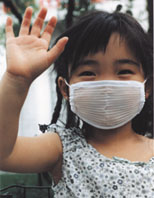Face masks at the ready
There seems to live in the common imagination of the West a version of the East, and more specifically Japan, that co-exists in Total Harmony with Nature. Some fuzzy headed notion of an innate mystical insight into the Force or New Agey "higher meaning" or any other Buddhism Lite concept.
Questionable mystical beliefs aside however, the Japanese do seem to have a greater appreciation of the rhythms of nature. I mean there are actual seasons here and not just the common variety of 4. Food follows the seasons. There are actual times when you CAN'T get any fruit or vegetable you want. Sorry, but you can't have strawberries in the middle of winter. I actually like this better than the 24/7/365 nature of food shopping back in the States, where anything can be delivered via deep freeze anytime, anywhere. It seems more real here, more in tune with the yearly cycle to be restricted in your choice of fresh produce by how your particular patch of Earth is spinning, just then, in relation to the sun. Every seasonal reappearance of your favorite fruit or vegetable is a cause for minor celebration.
Now it could be this way for a variety of reasons, one being that the Japanese only relatively recently (past 150 years or so) were primarily an agrarian society. Or it could be that restrictive tariffs and import policies throttle the importation of foreign foodstuffs. Fresh produce is certainly very expensive here. But whatever the reason, there seems to be with food, a greater connection to nature. So on this count, the Japanese seem to have gotten it right. However, they can also get it horribly, horribly wrong.

We are now entering the kafunsho season, or the "cedar pollen" season. As part of the post war rebuilding effort, millions of cedar pines were planted and harvested for the wood. In doing so, many other species of tree were crowded out, the result being a scary uniformity when looking at a Japanese hillside. And now every Spring those millions of trees in a reproductive frenzy squirt out tons and tons of pollen onto an increasingly allergic populace. It's not only a health issue, it's increasingly becoming an economic one as well. It's gotten so bad that "pollen free" sanctuaries are being established and families are making month long trips to either Hokkaido or Okinawa (both at the extreme northern and southern ends, respectively, of the archipelago) to escape where there are very few trees.
Around this time of year whole families start sporting face masks and goggles. The streets are full of people walking around like extras from the movie "Safe". Like refugees from some apocalyptic natural disaster, which in a way they are, but one with a very human cause. It's one instance when the Japanese just massively didn't "get" nature.





